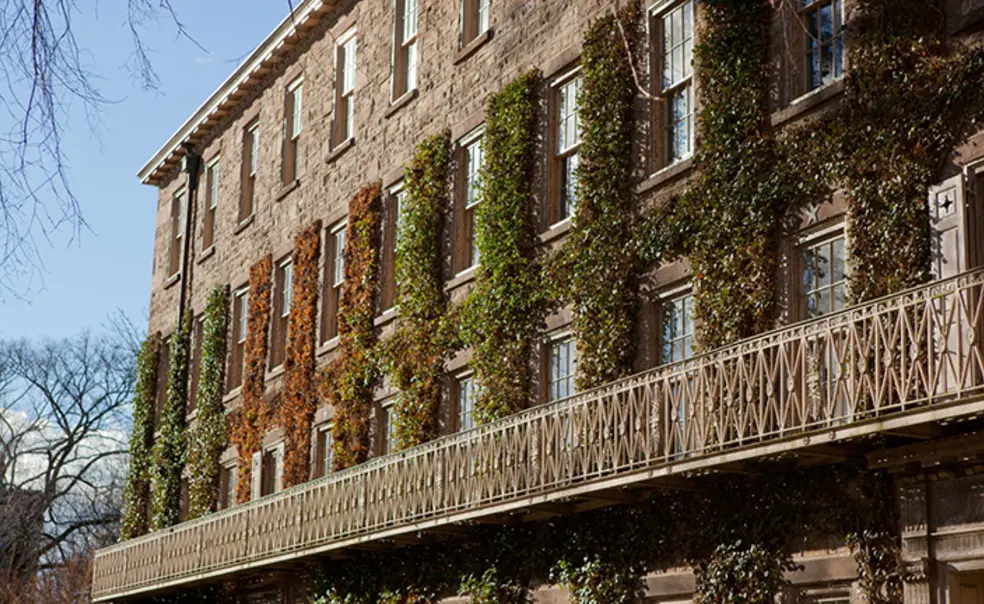Admissions Adapts For COVID With Single Deadline, Virtual Info Sessions
While recruiting prospective students in a virtual environment presents challenges, it also presents the admission office with new opportunities, said Dean of Admission Karen Richardson ’93. “Being able to do remote programs ... has allowed us to have a farther reach than we might normally,” she said. “And then, of course, it’s forced all of us to be more creative in how we think about reaching out to students.”
Virtual information sessions have been held twice a week — with one session held in the evenings. In October, the University held a virtual open house specifically for first-generation and low-income students. There also are weekly Tiger Talks, where prospective students can connect with current undergrads for more candid conversations without parents or admission officers present. Additionally students can take virtual tours of campus and connect with the University through podcasts and blogs.
It’s still too early to assess feedback from students, but Richardson said having these connections has been helpful — especially with international students and those in places the University may not typically visit, such as rural areas. It also gives admission officers more time since they don’t have to travel.
“Being able to do remote programs ... has allowed us to have a farther reach than we might normally.” — Karen Richardson ’93, dean of admission
“I do hope that we will continue to do some of the virtual programming that we have done [since the pandemic],” Richardson said.
In June, the University announced two changes for the 2020–21 admission cycle: suspension of standardized-testing requirements, in line with the other seven Ivy institutions, and elimination of the single-choice early-action deadline so there is only one deadline for all applicants (Jan. 1, 2021). Richardson said the University is not currently considering eliminating the testing requirements permanently.
The Common App and Coalition applications, which are both accepted by Princeton, have added essays for applicants to specifically address the impact of COVID-19 on their lives. Richardson noted these are optional, and there are no specific questions about COVID on Princeton’s application supplement. “We recognize that things have been difficult,” Richardson said. She added that what’s most important is context, so applicants can choose what to share.
Despite the shifts, Richardson said the office’s mission will not change. “What’s going to remain the same is that we will still be looking at all of our applicants in a holistic way,” she said. “It’s important for us as we are building a class to be thinking about who are the students who are going to come together and form this dynamic community.”
“Uncertainty” is the word Richardson used to describe much of the admission process this year — for everyone involved. “I guess that’s the question — what keeps you up at night? It’s just the uncertainty of the world right now,” she said. “But we are approaching it in a positive way and are really looking forward to reading applications and to building the great Class of 2025.”












1 Response
Lex Rieffel ’63
5 Years AgoAdmission By Lottery
The On the Campus story about admissions in the November issue of PAW reminded me of the arguments in favor of using a lottery to admit undergraduates to Princeton. These arguments appear stronger in the context of the COVID-19 pandemic and how life in the U.S. is likely to change in the decades ahead from this experience and other forces changing the workplace, such as robotics and artificial intelligence.
The admissions process could be restructured to produce a pool of candidates who meet a set of basic standards, or have petitioned to enter the pool based on special circumstances. The lottery would be designed to yield the class size desired. Sub-pools could be established to ensure diversity. Importantly, in my view, there would be no preference for athletes or any other skill or aptitude. The impact on varsity sports would probably be devastating, which I regard as a major advantage of admissions by lottery. Instead, intramural athletics and other “amateur” activities would be enriched to make the college experience much less elitist.